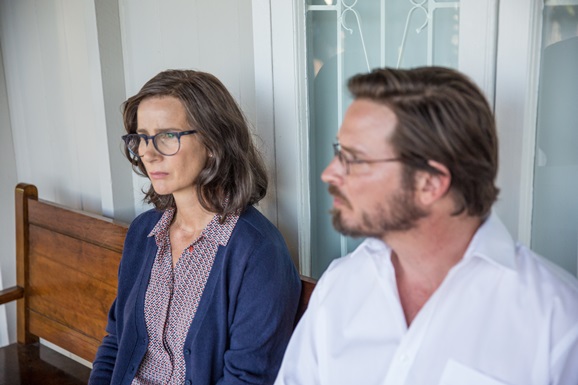'Don't Tell'.
Releasing on a respectable 80 screens around the country this week is the Australian court room drama Don’t Tell, about a young Toowoomba woman who took the Anglican church to court in 2001 for the sexual abuse she suffered at one of their schools. Though her tormentor – a teacher –had killed himself years earlier, her aim was to prove the church knew about him and did nothing.
For a case that would send tremors through the Australian political establishment, even shaking the ground beneath the country’s highest chair, the film begins in a modest register: a story of an overworked but idealistic small town lawyer (Aden Young) and his volatile yet determined young client, Lyndal (Sara West). It unfolds very much as a procedural, with a familiar series of promising leads and dead ends, reluctant witnesses and unexpected breakthroughs.
First time feature director Tori Garrett marshalls an impressive, well drilled cast including Jack Thompson as Lyndal’s courtroom advocate, Jacqueline McKenzie his opposite number and Rachel Griffiths as a counsellor.
Unfortunately, many other secondary characters seem to miss out. The jurors – so often the mirrors in which we see our own reflection in courtroom dramas – are barely given a line of dialogue. Even Lyndal’s parents (Susie Porter and Martin Sacks) remain underdrawn. It’s as if the trio of TV writers who adapted the book written by Young’s real life character Stephen Roche, couldn’t quite find the right composition for their fresco of heroes, villains and interested bystanders.
Aden Young is at the centre of the picture a lot of the time, battling his more cynical, or perhaps realistic, older colleague on the one hand, dealing with Lyndal’s frequent emotional outbursts on the other, all the while trying to be there for his young family, who miss him. And yet ultimately, it’s not really his story, or at least the film doesn’t give him that, as it shifts focus to Thompson’s glory in court, and ultimately, of course, Sara West’s Lyndal.
She is, by the way, fantastic in the film. To sustain a performance that’s perched on a knife edge between vulnerability and defiance for a whole film is a credit to her and Garrett.
But compare Don’t Tell to the Oscar winning Spotlight – another film about a specific set of crimes against children and it’s clear how much more focused and sharply political the American film was. Don’t Tell is subtle in reminding us that this court case was the beginning of the end for Australia’s Governor General Peter Hollingworth, because of his role as Brisbane’s Anglican archbishop when Lyndal’s abuse occurred. It stops short of suggesting Church indifference is emblematic of a pattern in Australian history where the powerful have continually turned a blind eye to past wrongs. That parallel is there to be made, however.
What Don’t Tell does try to do, though far too late I depict, is how cowardice afflicts the human soul. When Lyndal’s former school principal takes the stand, you catch a glimpse, finally, of a man who knows he’s given in to an unforgivable compromise. Jack Thompson's final speech articulates what we the audience already know, that an absence of justice for Lyndal erodes our integrity as a community. You feel like the film might have found a way to make this point earlier, but instead it plays out in a more black and white binary, focusing on characters who seem much less conflicted.
It’s a question perhaps of favouring plot over theme. Spotlight was just as full of procedural detail and characters, but with a better script it somehow cut straight through the layers to the core issues, sometimes visually, with the way it framed shots of suburban houses overlooked by ominous church steeples.
While Don’t Tell does conjure some images that speak up powerfully, they’re not quite given the space they need. A close-up of Lyndal on a train platform with a bottle in her hand as a series of freight carriages rattle through the back of shot for example, is crowded out by dialogue. A school ballet concert that’s a sudden burst of colour and innocence is over too soon for it to really disrupt the flow of the film with a reminder of what’s at stake in crimes like this.
Don’t Tell is two films, in a way, the film it is and the film it could have been. To its credit, the distance between the two is sometimes not much at all, but it never completely disappears.
Listen to Jason Di Rosso's interview with 'Don't Tell' star Jack Thompson here.


